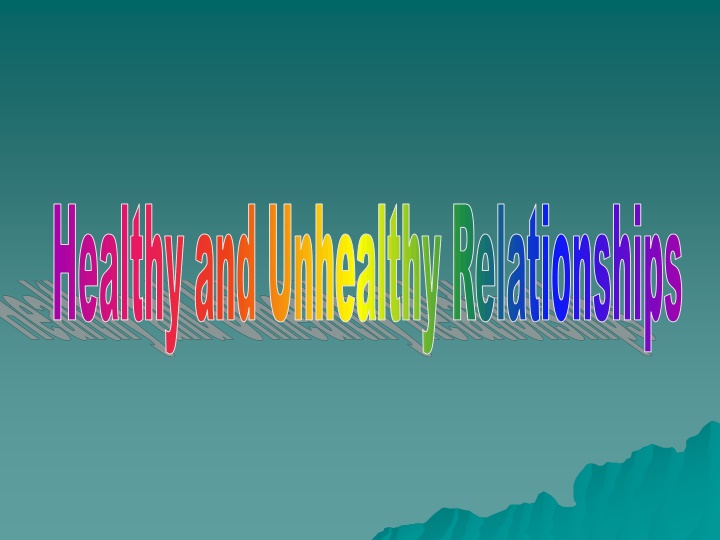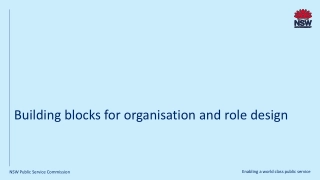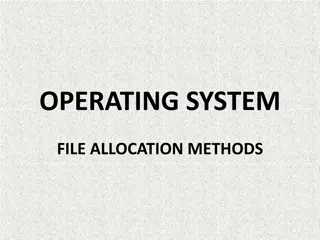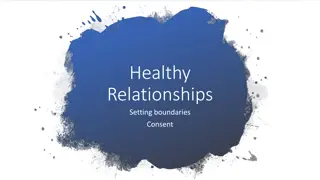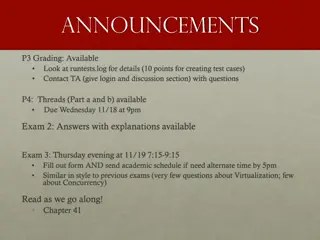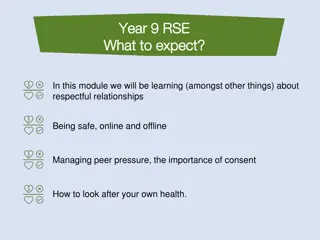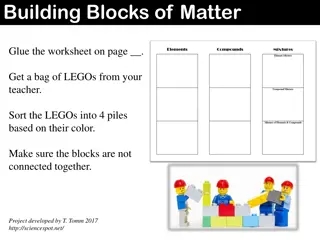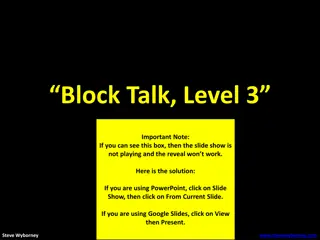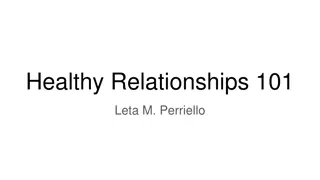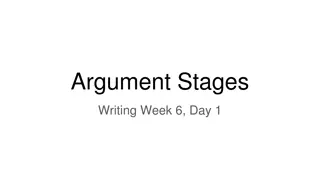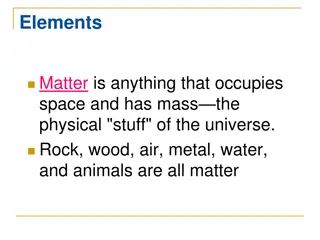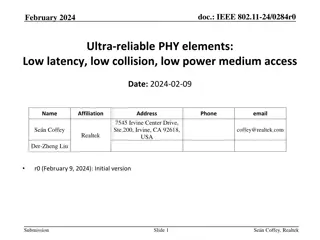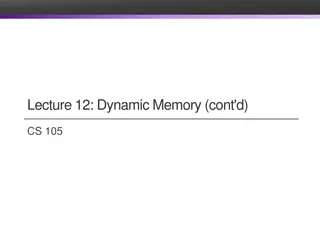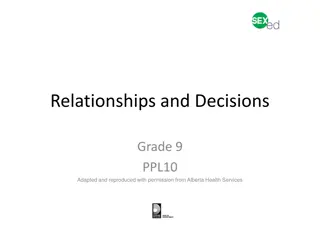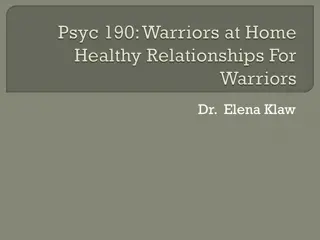Building Healthy Relationships: Key Elements and Building Blocks
Building a healthy relationship involves elements such as honesty, trust, respect, and communication. Both partners need to actively work towards maintaining these building blocks for a solid foundation. Mutual respect, trust, honesty, open communication, non-violence, self-esteem, personal responsibility, maintaining individual interests, and respecting each other's boundaries are crucial for cultivating a healthy relationship.
Download Presentation

Please find below an Image/Link to download the presentation.
The content on the website is provided AS IS for your information and personal use only. It may not be sold, licensed, or shared on other websites without obtaining consent from the author.If you encounter any issues during the download, it is possible that the publisher has removed the file from their server.
You are allowed to download the files provided on this website for personal or commercial use, subject to the condition that they are used lawfully. All files are the property of their respective owners.
The content on the website is provided AS IS for your information and personal use only. It may not be sold, licensed, or shared on other websites without obtaining consent from the author.
E N D
Presentation Transcript
WHAT DOES A HEALTHY RELATIONSHIP LOOK LIKE? Building a healthy relationship is much like building a house. There are elements such as HONESTY, TRUST, RESPECT AND COMMUNICATION that form the foundation. You have to actively want these building blocks and you can evaluate your relationship by looking for these key ingredients. This takes work! If any of the qualities we will talk about during this time are missing from your relationship, talk openly with your partner about your concerns and needs. It takes both partners working together to make the relationship a healthy one.
If one person is over-functioning in a relationship, the other is under-functioning, and this does not create a balanced, solid foundation. Most importantly, you need to believe that YOU deserve respect, honesty, trust and positive communication, and that you will not settle for a relationship that does not have these building blocks.
Building Blocks to a Healthy Relationship Foundation: Mutual Respect: People in healthy relationships respect each other s opinions, feelings, goals and decisions, even if they don t always agree with each other. Trust: People in healthy relationships are not jealous or possessive of each other. Honesty: People in healthy relationships don t lie to one another, cheat on one another or behave in unethical ways with one another. Open Communication: People in healthy relationships communicate with each other in an open and honest way. They do not use words to hurt each other.
Building Blocks: Non-Violence: People in healthy relationships do not hit, threaten or otherwise scare each other. Self Esteem: People who believe in themselves and their own worth are better able to believe in the worth of their intimate partner. Personal Responsibility: People in healthy relationships take responsibility for their own actions and feelings. They do not blame each other if they lose their temper or make a bad decision.
Continue own friendships and interests: People in healthy relationships continue their own interests and friendships outside of their romantic relationships. They don t feel isolated from friends and family. Non-abuse of alcohol and other drugs: People in healthy relationships do not pressure each other to use alcohol and other drugs. They do not get high to make the relationship better. Accepting each other s right to say no and the right to change their mind: People in healthy relationships don t pressure or force the other person to have sex or to do things they are not comfortable doing.
MORESIGNS OF A GOOD RELATIONSHIP Does your partner or friend have a sense of joy in life? Do you enjoy his/her ideas and have a good rapport with them? Do you feel a real connection, laughing together and catching meanings in the same way? Is there a best friend quality to your relationship? Can you really be yourself without criticism? Do you feel relaxed with him/her? Do you feel warmth and understanding from him/her?
The Five Languages of Love Taken from The Five Love Languages by Gary Chapman Touch Quality Time Gifts Affirmations Service If you don t know what your significant other s language is, think about what you hear complaints about: we never do anything together or you re never here . These are probably indications that the significant other wants quality time to fill up his/her love bank.
RIGHTS RESPECT RESPONSIBILITY
RIGHTS I have the right not to be abused. I have the right to develop my talents. I have the right to privacy. I have the right to express my own thoughts and feelings. I have the right to develop and have friendships. I have the right not to be perfect.
RESPECT Respect is to feel or show honor or esteem for. Respect is to value as an equal. Respect is to show consideration for.
RESPONSIBILITY I am responsible for what I think, feel and do. I am responsible for my health and safety. I am responsible to develop and communicate my personal boundaries. I am NOT responsible for what others think, feel and do.
I HAVE THE RESPONSIBILITY: To respect the limits of others. To communicate clearly and honestly. To not violate the limits of others. To ask for help when I need it. To be considerate. To check my actions/decisions to determine if they are good or bad for me. To set high goals. To determine my limits and values.
RUN THE OTHER WAY! If he/she is EXTREMELY JEALOUS and gets angry and abusive or sulky if you have friends or any warm feelings for anyone else. If he/she is POSSESSIVE and feels you belong to them so much so that others can not have any of your time or attention. If he/she is EXPLOSIVE and yells, screams, hits walls or hits or threatens to hit others. If he/she CANNOT ACCEPT RESPONSIBILITY AND BLAMES OTHERS for their own abusive or violent behaviors. If he/she is CONTROLLING OR DICTATORIAL your partner defines how you should look, what you should say, where you should or shouldn t go, and who you should talk with. Partner makes all the important decisions.
If he/she HAS LOW SELF-ESTEEM and declares they arent anything without you, or show other signs of low self-worth. If they want to TAKE CARE OF YOU or want you to take care of them. If he/she has a FAMILY HISTORY OF VIOLENCE OR ABUSE between parents, relatives, or significant others. If you witness name-calling, fighting, hitting, pushing, shoving, weapons use, etc. If he/she makes FREQUENT USE OF ALCOHOL OR DRUGS, and blames the chemicals for abusive or violent behaviors. If he/she has RIGID SEX ROLE EXPECTATIONS, such as men should always be the boss and be in charge, and women have low status or are less important. If he/she displays a DR. JEKYLL-MR. HYDE PERSONALITY with marked shifts back and forth from being angry, controlling, abusive to nice, charming, and loving. Mood swings are unpredictable.
